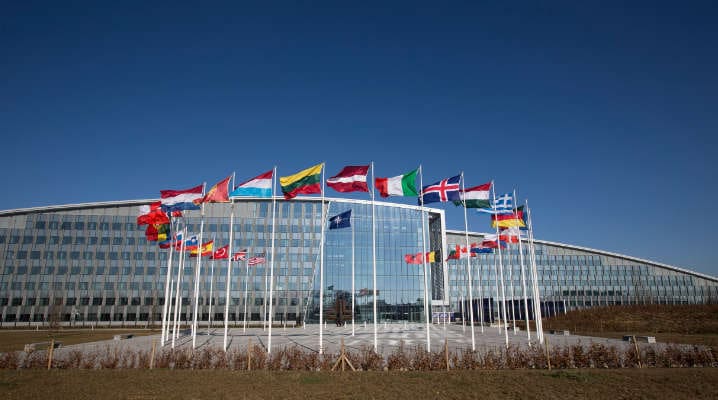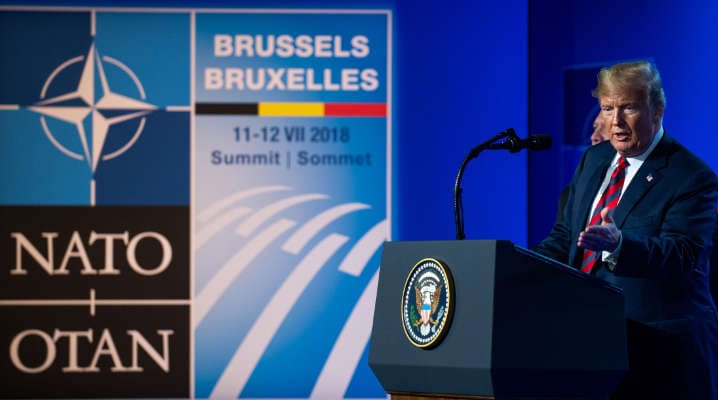Fifteen years ago, when the Iraq war divided the NATO Allies and some even talked of the end of the Atlantic Alliance, veteran journalist Jim Hoagland remained calm. Predictions about the imminent demise of NATO had been around for ages, he said during a brainstorm with NATO ambassadors. And, with a wink, he even put some of the blame on fellow journalists: “Whenever we at the Washington Post have a slow news day, we publish a ‘Whither NATO?’ piece.”
Hoagland's serenity proved justified: the transatlantic relationship quickly recovered.

Predictions about the imminent demise of NATO have been around for ages… In July 2018, at the new NATO Headquarters in Brussels, the leaders of the 29 member states met to chart NATO’s path for the years ahead. © NATO
But times change. Today, the European Union struggles with numerous crises, from “Brexit” to burgeoning nationalism. Formats like the G-7 no longer seem to generate the common leadership on global issues that Western nations have sought to exert for so long. The narrative about the “demise of the West” appears to be gaining more and more traction. And the notion that even the venerable NATO may well be dispensable is no longer confined to the “usual suspects” from the academic ivory tower or the wilder shores of isolationism.
What would a world without NATO look like?
It is a useful question to ask, because such a counterfactual experiment helps to sharpen the focus on what would be at stake. After all, the end of NATO would mean much more than just the disappearance of a bureaucracy in Brussels. It would mean nothing less than the end of an institutionalised political and military link between Europe and North America.
The political and military consequences of such a development would be manifold – and dangerous.
The end of collective defence
The dissolution of the Atlantic Alliance would mean the end of transatlantic collective defence. Europe would have to provide for its security without the United States. For some Euro-enthusiasts, who have long sought Europe’s “emancipation” from the United States, such a prospect might seem like a dream come true. For those, by contrast, who still view the transatlantic community as a unique and indispensable achievement, it would look like a nightmare.
Building a purely European defence would overwhelm the Europeans politically, financially and militarily. Attempting to compensate even partially for the departure of the United States would mean dramatic increases in defence spending and a radical overhaul of European arms development and procurement procedures. Even more, it would ultimately require a genuine European security policy, including a consensus on a European nuclear deterrent, which is nowhere in sight.
In other words, the disappearance of NATO would call for a further deepening of European integration in the very field where integration is most difficult. And all this would come at a time when many nation states want less Europe, not more.
An increase in Russia’s power in Europe
By contrast, the end of NATO would dramatically increase Russia's position in European security. With the United States effectively ceding its status as a “European power”, the temptation and the opportunities for Russia to divide or intimidate its European neighbours would grow.
It has been said that NATO’s continued existence creates a problem for Russia. That may well be true, but the disappearance of the Alliance would create a problem for Europe: without the NATO protective umbrella, Europe would lack the self-confidence required for a coherent and constructive engagement with the Eurasian power. Some European countries would seek their own deals with Moscow.
Moreover, for many countries in the post-Soviet space, which want to demonstrate their independence from Russia through their relations with NATO, the end of an American security role in Europe would be a strategic disaster. The new “post-American” power balance in Eurasia would condemn them to remain permanently in Russia’s sphere of influence.
Diminishing military interoperability
And there is more. The end of NATO would also deprive Europeans and North Americans of an important framework of legitimacy for the use of military power.
Without the broader NATO framework, the political and military stamina required for dangerous and long-term stabilisation missions, such as Afghanistan, could not be generated. Ad hoc military operations among the United States, Canada and European countries would still be possible – but the disappearance of NATO's common defence planning and exercise practice would result in ever-diminishing military interoperability among them. Without the United States as the military centre of gravity, European military standards would most likely regress towards the lowest common denominator.
Sooner rather than later, the United States and most of its former allies would lose their ability to cooperate militarily. Without the tried and tested NATO procedures and standards, even the United States’ role as a military enabler (“leading from behind”) would become far more difficult.
The regionalisation of security
If NATO ceased to exist, it would inevitably encourage the regionalisation of security. Without the Alliance as a strategic bracket for bridging different regional security interests, southern European countries would tend to focus on the Maghreb and the Middle East, while eastern European countries would focus more on Russia. However, without the United States as their security backbone, none of these groupings would have enough political cohesion and military strength to exert a lasting influence on their respective regions of interest. The result would be a further weakening of Europe as a strategic actor.
NATO’s unique network of partnerships with dozens of countries from all over the globe would disappear as well, forcing Europe and North America to fall back on a host of complicated bilateral relationships.
Wider implications for Allies and partners
The end of the Alliance would also be an enormous challenge for Allies such as Canada or Turkey, as they do not have the opportunity to organise their ties to Europe through membership of the European Union.
It would even pose a major dilemma for non-NATO countries such as Finland and Sweden. Since their pragmatic policy of military non-alignment is made feasible by a continuing American role in European security, an end of this unique role would significantly change these countries’ strategic environment and could reduce their latitude as engines of regional cooperation.
Finally, without the prospect of NATO accession, the West would also lose much of its influence on the reform processes in the candidate countries from southeast Europe to the Caucasus.

Calls for fairer burden-sharing among NATO Allies were high on the agenda at the Brussels Summit in July 2018. © NATO
A bad deal
And what about transatlantic burden-sharing? Would the end of NATO not at least ensure that the United States were finally relieved of an “unfair” financial and military burden?
Hardly. The United States defence budget reflects the military expenditures of a global power. It therefore goes well beyond NATO, which at the highest estimate represents no more than 15 per cent of total United States defence spending. Consequently, the dissolution of NATO would translate into relatively small savings for the United States, yet Washington would lose allies, military bases and the political predictability established through daily multilateral consultations in the Alliance framework.
The geopolitical winners would be China, Russia and all those who, by using the clarion call of the need to build a “multipolar world”, seek to weaken the United States’ role in upholding international order.
In sum, for all these reasons, a world without NATO would be a bad deal for the United States, for its Allies, and for partners in Europe and beyond.
